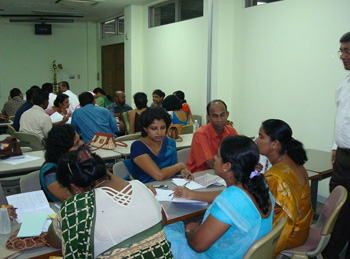A lack of emphasis on ‘Spoken English’ in local schools may be the cause of lacklustre Information Technology (IT) adoption in Sri Lanka.
This is purportedly because experts believe an absence of adequate English skills proves to be a psychological barrier stopping people from even accessing knowledge via resources such as the Internet.
According to Presidential Advisor and English Coordinator for the Presidential Task Force on English and IT, Sunimal Fernando, English and IT skills are basically two sides of the same coin, both are needed to access opportunity in this day and age.
 |
| A training programme |
Mr. Fernando's remarks coincided with the completion of the first phase of an ambitious government plan to completely re-train of all its approximately 22,000 English teachers using an accelerated 18 months schedule, costing Rs. 55 million, in accordance with methodologies taught to the 40 master trainers by Hyderabad's English and Foreign Languages University (EFLU), India's centre for excellence in teaching English. So far, over 630 teachers have been re-trained by these 40 master trainers as part of the first phase, while master trainers have also begun the process of overhauling the teaching manual for English and related materials as per EFLU's doctrines. This process has been helped along by a Cabinet decision which ordered the updating of the syllabus for Grade Six and above by adding a Spoken English module.
This move will also lead to changes in the examinations systems where an English practical speaking test will be needed to test ‘Spoken English’ in the classroom.
Meanwhile, again according to Mr. Fernando, the next step in the re-training process is increasing the cadre of master trainers to a more appropriate force to achieve the goal of 22,000 English teachers. This would require existing trainers to instuct an additional 80 high-quality prospects resulting in an overall group numbering 120. Costs for the re-training are expected to be borne by the Asian Development Bank's Secondary Education Modernisation Project.
In addition, the Presidential Task Force on English and IT, in conjunction with the Dharmavahini Foundation, will roll out a 200 module ‘Spoken English’ distance learning television programme in June. When aired, the programme will enable people to not only effectively learn ‘Spoken English’ at home as per EFLU methods, but, if they so choose, it gives them the opportunity to also register with a technical training institute and take exams based on televised ‘Spoken English’ modules, ultimately allowing them to gain certification.
|

